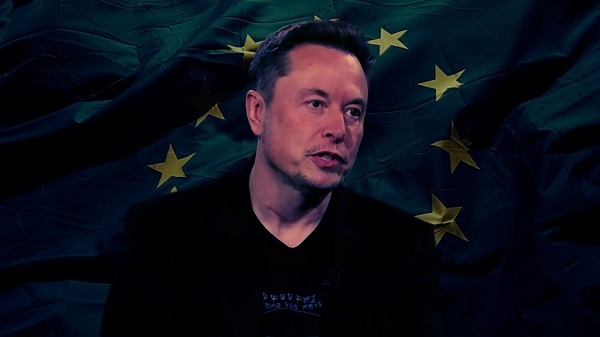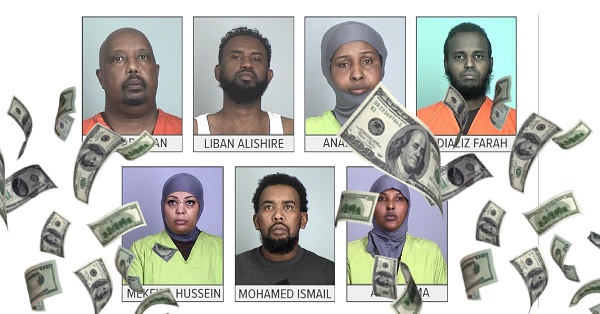Business
From X to SpaceX: EU Regulators Could Fine Musk Companies For Free Speech Push

From Reclaim The Net
|
The EU and Brazil are sharpening their regulatory knives, and who better to test their shiny new powers on than Elon Musk, the guy who seems to have made annoying pro-censorship bureaucrats his full-time hobby? Musk’s social media platform, X has become the latest target for both the European Union and Brazil — but they’re not just going after X anymore. The powers-that-be have decided that since X isn’t worth much these days, maybe they should slap fines on Musk’s other companies—SpaceX, Neuralink, xAI, and even the Boring Company—just because they can.
It’s the ultimate power move by regulators who seem to be more interested in flexing their muscles than addressing real issues. Why settle for a measly 6% fine on a struggling social media platform when you can drag in rockets, to pad the bill? The EU’s Latest Power Trip: Digital Services Act as a Blank Check Enter the Digital Services Act (DSA), the EU’s newest favorite tool for cracking down on “disinformation” and “hate speech” on major digital platforms. It’s got all the right buzzwords—”transparency,” “safety,” and “accountability”—but underneath the noble-sounding veneer, it’s starting to look more like a blank check for the EU to assert control over Big Tech. The law allows for fines of up to 6% of annual revenue for platforms that don’t comply. But when it comes to X, with its plummeting value—now at a measly $9.4 billion, according to Fidelity—the EU seems to be thinking, “Why stop at X when we can go after Musk’s entire empire?” Think about it: SpaceX, Neuralink, the Boring Company—what do they have to do with social media disinformation? Nothing, really. But the EU’s got a grudge, and they’re not about to let a little thing like fairness or logic get in their way. Musk’s decision to pull X out of the EU’s voluntary Code of Practice against disinformation in 2023 certainly didn’t help matters. Sure, he had initially played nice back in 2022, but when Musk realized that the EU’s idea of “voluntary” meant “you’ll comply, or else,” he bailed. Now, Brussels is retaliating by threatening to fine Musk’s companies that have nothing to do with social media, all while pretending this is about “protecting democracy.” If it sounds more like a personal vendetta than a reasoned policy decision, that’s because it probably is. Brazil Freezes Musk’s Assets: Free Speech or Free for All? Not to be outdone by their European counterparts, Brazil has decided to take its regulatory saber-rattling to new heights. The country’s highest court recently froze the assets of Starlink, Musk’s satellite internet venture, in an effort to squeeze a $3 million fine out of X for failing to censor content. That’s right—Brazil couldn’t get X to bend to their will, so they decided to take Musk’s satellites hostage. All in the name of combating “misinformation,” of course. What’s particularly galling about Brazil’s move is how blatantly it ignores the principles of free speech and open communication. The accusation that X “facilitated the spread of misinformation and hate speech” sounds noble on paper, but the way Brazil went about enforcing their demands—by freezing assets of an entirely separate company—looks more like strong-arm tactics than legitimate regulation. At this point, it’s hard to escape the conclusion that these governments are less concerned with disinformation and more interested in exerting control over tech companies that refuse to play by their increasingly arbitrary rules. Musk, who’s spent years promoting free speech as one of X’s core principles, is now facing a global game of whack-a-mole, with each country seemingly more eager than the last to punish him for refusing to fall in line. Personal Accountability or Public Power Play? One of the more interesting twists in the EU’s regulatory circus is the suggestion that they might hold Musk personally accountable under the DSA. Why? Because, according to the EU’s interpretation, “the entity exercising decisive influence” over a platform—whether that’s a company or an individual—can be on the hook for any wrongdoing. In other words, if Musk’s platform doesn’t comply, they’re coming for him directly. This is about using Musk as a punching bag to show the world that the EU is still in charge. Thomas Regnier, a spokesperson for the European Commission, helpfully clarified to Bloomberg, that the DSA’s rules apply “irrespective of whether the entity… is a natural or legal person,” which is bureaucrat-speak for, “We’re gunning for Elon.” |
|
|
|
Since you’re reading this, we hope you find Reclaim The Net useful. Today, we could use your help. We depend on supporters (averaging $15), but fewer than 0.2% of readers choose to give. If you donate just $5, (or the equivalent in your currency) you would help keep Reclaim The Net thriving for years. You don’t have to become a regular supporter; you can make a one-time donation. Please take a minute to keep Reclaim The Net going.
Thank you.
|
Business
Largest fraud in US history? Independent Journalist visits numerous daycare centres with no children, revealing massive scam

A young journalist has uncovered perhaps the largest fraud scheme in US history.
He certainly isn’t a polished reporter with many years of experience, but 23 year old independent journalist Nick Shirley seems to be getting the job done. Shirley has released an incredible video which appears to outline fraud after fraud after fraud in what appears to be a massive taxpayer funded scheme involving up to $9 Billion Dollars.
In one day of traveling around Minneapolis-St. Paul, Shirley appears to uncover over $100 million in fraudulent operations.
🚨 Here is the full 42 minutes of my crew and I exposing Minnesota fraud, this might be my most important work yet. We uncovered over $110,000,000 in ONE day. Like it and share it around like wildfire! Its time to hold these corrupt politicians and fraudsters accountable
We ALL… pic.twitter.com/E3Penx2o7a
— Nick shirley (@nickshirleyy) December 26, 2025
Business
“Magnitude cannot be overstated”: Minnesota aid scam may reach $9 billion

Federal prosecutors say Minnesota’s exploding social-services fraud scandal may now rival nearly the entire economy of Somalia, with as much as $9 billion allegedly stolen from taxpayer-funded programs in what authorities describe as industrial-scale abuse that unfolded largely under the watch of Democrat Gov. Tim Walz. The staggering new estimate is almost nine times higher than the roughly $1 billion figure previously suspected and amounts to about half of the $18 billion in federal funds routed through Minnesota-run social-services programs since 2018, according to prosecutors. “The magnitude cannot be overstated,” First Assistant U.S. Attorney Joe Thompson said Thursday, stressing that investigators are still uncovering massive schemes. “This is not a handful of bad actors. It’s staggering, industrial-scale fraud. Every day we look under a rock and find another $50 million fraud operation.”
Authorities say the alleged theft went far beyond routine overbilling. Dozens of defendants — the vast majority tied to Minnesota’s Somali community — are accused of creating sham businesses and nonprofits that claimed to provide housing assistance, food aid, or health-care services that never existed, then billing state programs backed by federal dollars. Thompson said the opportunity became so lucrative it attracted what he called “fraud tourism,” with out-of-state operators traveling to Minnesota to cash in. Charges announced Thursday against six more people bring the total number of defendants to 92.
BREAKING: First Assistant U.S. Attorney Joe Thompson revealed that 14 state Medicaid programs have cost Minnesota $18 billion since 2018, including more than $3.5 billion in 2024 alone.
Thompson stated, "Now, I'm sure everyone is wondering how much of this $18 billion was… pic.twitter.com/hCNDBuCTYH
— FOX 9 (@FOX9) December 18, 2025
Among the newly charged are Anthony Waddell Jefferson, 37, and Lester Brown, 53, who prosecutors say traveled from Philadelphia to Minnesota after spotting what they believed was easy money in the state’s housing assistance system. The pair allegedly embedded themselves in shelters and affordable-housing networks to pose as legitimate providers, then recruited relatives and associates to fabricate client notes. Prosecutors say they submitted about $3.5 million in false claims to the state’s Housing Stability Services Program for roughly 230 supposed clients.
Other cases show how deeply the alleged fraud penetrated Minnesota’s health-care programs. Abdinajib Hassan Yussuf, 27, is accused of setting up a bogus autism therapy nonprofit that paid parents to enroll children regardless of diagnosis, then billed the state for services never delivered, netting roughly $6 million. Another defendant, Asha Farhan Hassan, 28, allegedly participated in a separate autism scheme that generated $14 million in fraudulent reimbursements, while also pocketing nearly $500,000 through the notorious Feeding Our Future food-aid scandal. “Roughly two dozen Feeding Our Future defendants were getting money from autism clinics,” Thompson said. “That’s how we learned about the autism fraud.”
The broader scandal began to unravel in 2022 when Feeding Our Future collapsed under federal investigation, but prosecutors say only in recent months has the true scope of the alleged theft come into focus. Investigators allege large sums were wired overseas or spent on luxury vehicles and other high-end purchases. The revelations have fueled political fallout in Minnesota and prompted renewed federal scrutiny of immigration-linked fraud as well as criticism of state oversight failures. Walz, who is seeking re-election in 2026 after serving as Kamala Harris’ running mate in 2024, defended his administration Thursday, saying, “We will not tolerate fraud, and we will continue to work with federal partners to ensure fraud is stopped and fraudsters are caught.” Prosecutors, however, made clear the investigation is far from finished — and warned the final tally could climb even higher.
-

 International1 day ago
International1 day agoOttawa is still dodging the China interference threat
-

 Business1 day ago
Business1 day agoThere’s No Bias at CBC News, You Say? Well, OK…
-

 Automotive1 day ago
Automotive1 day agoCanada’s EV gamble is starting to backfire
-

 International1 day ago
International1 day ago2025: The Year The Narrative Changed
-

 Business2 days ago
Business2 days agoResidents in economically free states reap the rewards
-

 Alberta2 days ago
Alberta2 days agoAlberta project would be “the biggest carbon capture and storage project in the world”
-

 Bruce Dowbiggin2 days ago
Bruce Dowbiggin2 days agoBe Careful What You Wish For In 2026: Mark Carney With A Majority
-

 Daily Caller2 days ago
Daily Caller2 days agoUS Halts Construction of Five Offshore Wind Projects Due To National Security






